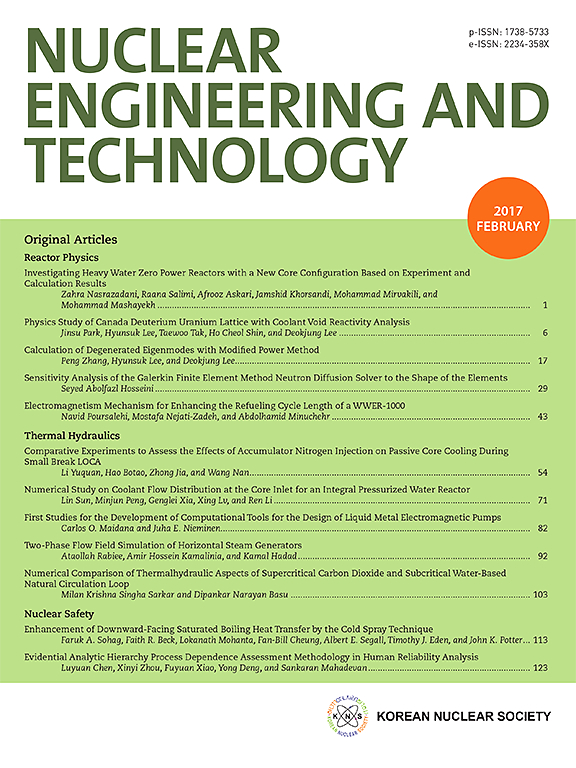Research on key factors influencing public acceptance of nuclear facilities decommissioning projects
IF 2.6
3区 工程技术
Q1 NUCLEAR SCIENCE & TECHNOLOGY
引用次数: 0
Abstract
Public acceptance plays a crucial role in advancing nuclear facility decommissioning projects. Based on questionnaire survey data (n = 1001), this study evaluated public acceptance levels in a specific Chinese region and examines key influencing factors and their pathways. The results indicate that public acceptance in the surveyed region remains at a moderate level, with familiarity scoring the lowest. Both perceived benefits and perceived risks are also rated as moderate. Weighted factor analysis reveals that familiarity exerts a stronger influence on public acceptance than trust, perception risk, or perception benefit. Specifically, public acceptance is primarily shaped by three factors: personal relevance to the nuclear, cognitive understanding, and safety perceptions. This suggests that local residents base their decisions primarily on subjective perceptions, with particular emphasis on perceived risks associated with decommissioning. Furthermore, the study demonstrates that perceived risk has a significant negative impact on public acceptance, whereas perceived benefits show no statistically significant positive effect. Trust and familiarity not only directly enhance acceptance but also indirectly influence it by mediating perceived benefits and risks. In conclusion, efforts to improve public acceptance in this region should prioritize increasing public familiarity with nuclear decommissioning and implementing targeted communication strategies to mitigate excessive risk perception.
影响公众对核设施退役项目接受程度的关键因素研究
公众接受度在推进核设施退役项目中起着至关重要的作用。基于问卷调查数据(n = 1001),本研究评估了中国特定地区的公众接受程度,并探讨了关键影响因素及其途径。结果表明,被调查地区的公众接受度仍然处于中等水平,熟悉度得分最低。感知收益和感知风险也被评为中等。加权因子分析表明,熟悉度对公众接受度的影响大于信任、感知风险或感知收益。具体而言,公众接受度主要由三个因素决定:个人与核的相关性、认知理解和安全感知。这表明当地居民的决定主要基于主观看法,特别强调与退役相关的感知风险。此外,研究表明,感知风险对公众接受度有显著的负向影响,而感知利益对公众接受度没有统计学上显著的正向影响。信任和熟悉不仅可以直接提高接受度,还可以通过中介感知利益和风险来间接影响接受度。总之,提高该地区公众接受度的努力应优先考虑提高公众对核退役的熟悉程度,并实施有针对性的沟通策略,以减轻过度的风险认知。
本文章由计算机程序翻译,如有差异,请以英文原文为准。
求助全文
约1分钟内获得全文
求助全文
来源期刊

Nuclear Engineering and Technology
工程技术-核科学技术
CiteScore
4.80
自引率
7.40%
发文量
431
审稿时长
3.5 months
期刊介绍:
Nuclear Engineering and Technology (NET), an international journal of the Korean Nuclear Society (KNS), publishes peer-reviewed papers on original research, ideas and developments in all areas of the field of nuclear science and technology. NET bimonthly publishes original articles, reviews, and technical notes. The journal is listed in the Science Citation Index Expanded (SCIE) of Thomson Reuters.
NET covers all fields for peaceful utilization of nuclear energy and radiation as follows:
1) Reactor Physics
2) Thermal Hydraulics
3) Nuclear Safety
4) Nuclear I&C
5) Nuclear Physics, Fusion, and Laser Technology
6) Nuclear Fuel Cycle and Radioactive Waste Management
7) Nuclear Fuel and Reactor Materials
8) Radiation Application
9) Radiation Protection
10) Nuclear Structural Analysis and Plant Management & Maintenance
11) Nuclear Policy, Economics, and Human Resource Development
 求助内容:
求助内容: 应助结果提醒方式:
应助结果提醒方式:


